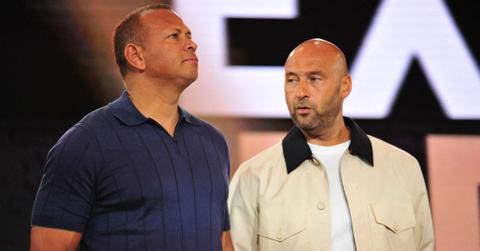Will Alex Rodriguez’s Association With Steroids Keep Him out of the Hall of Fame?
Past controversies are believed to be holding him back.
Published Nov. 13 2025, 9:35 a.m. ET

Alex Rodriguez had a heck of a career in Major League Baseball. When he entered the league at just 18 years old after being drafted by the Seattle Mariners, he was only the third person to be assigned the shortstop position in nearly a century. He also established himself as a redoubtable offensive force, clocking in 696 home runs throughout his career: the fourth most in professional baseball history.
Considering the aforementioned distinctions, along with a slew of other accolades, one would think his Hall of Fame induction chances should be pretty good.
What are the chances that Alex Rodriguez gets into the baseball hall of fame?
In January of 2025, the NY Daily News detailed why A-Rod is facing an uphill battle in becoming a Hall of Famer. At the time of the article's publication, the outlet highlighted that the Baseball Writers' Association (BBWAA) reported that Rodriguez was only featured on 37.1 percent of 294 submitted ballots.
This is slightly less than half of the votes needed for A-Rod to get the Hall of Fame nod, as candidates must reach the 75 percent threshold in order to officially qualify. As the publication points out, Rodriguez had been eligible to enter the distinguished echelon of baseball players for about four years.

Is A-Rod eligible for the hall of fame?
As of 2025, ARod has six years remaining for his Hall of Fame eligibility. Newer voters in the league indicate that they are more apt to put the home run expert on their voting cards.
However, these prospects haven't improved over time. In 2022, the MLB reported that Rodriguez's ballot percentages were at 34.3 percent, similar to what he garnered in 2025. Both Major League Baseball and the NY Daily News wrote that the lack of voting fervor for his induction was primarily attributed to controversies surrounding the usage of performance-enhancing drugs while he was a professional athlete.
ESPN reported back in February of 2009 that Rodriguez did indeed admit to taking banned substances during his three-year tenure with the Texas Rangers, which began in 2001. A-Rod chalked up his decision to do so as a means of rising to mounting expectations under a much different cultural landscape within the league.
"When I arrived in Texas in 2001, I felt an enormous amount of pressure. I felt like I had all the weight of the world on top of me and I needed to perform, and perform at a high level every day," A-Rod told the sports network during an interview.
He continued, "Back then, [the sport] was a different culture. It was very loose. I was young. I was stupid. I was naive. And I wanted to prove to everyone that I was worth being one of the greatest players of all time. I did take a banned substance. And for that, I am very sorry and deeply regretful."
His admission came on the heels of his responding to allegations that he had indeed tested positive for steroids. However, scandals involving PEDs didn't end there. Rodriguez was banned from playing in the league for the entirety of the 2014 season after he was wrapped up in the Biogenesis conflict that included 13 other players.
The controversy is named after the shut-down clinic that purportedly disseminated performance-enhancing drugs, including testosterone and human growth hormone, to 14 MLB players, including Alex Rodriguez.
A-Rod was accused of attempting to obstruct investigations into the scandal, and he was the only player named in the controversy to officially appeal it.
Rodriguez contested that the scandal was a way to cut $22 million off his Yankees agreed-upon contract and that the decision to ban him was levied against him despite the fact that he didn't fail a drug test. In a separate NY Daily News article, the site published a timeline of A-Rod's career.
A year before the Biogenesis allegations published by the Miami New Times, A-Rod underwent his second hip surgery in just four years. Rodriguez joined the Yankees in 2004 and signed a 10-year $275 million contract extension in 2007.